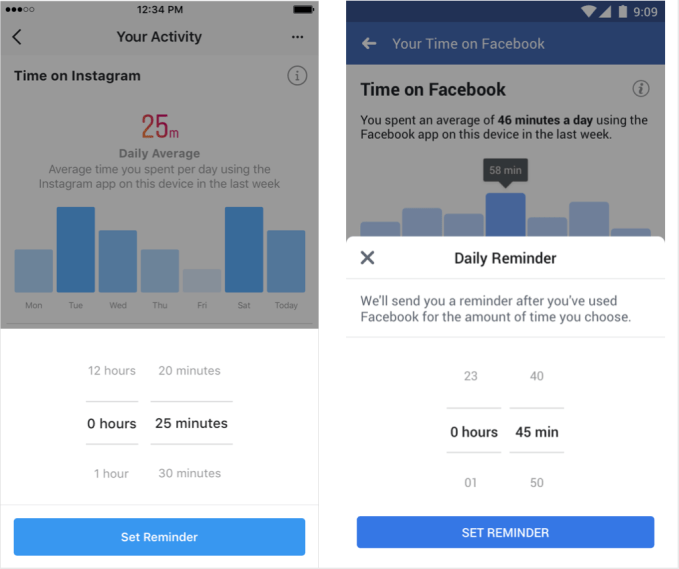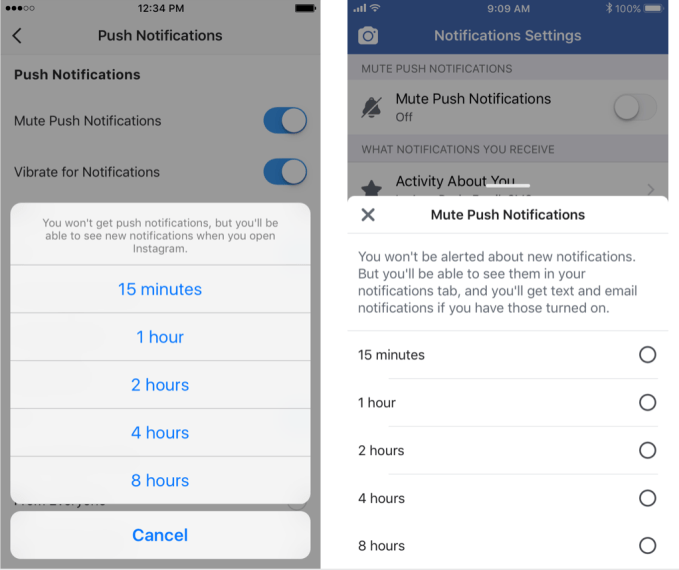Facebook and Instagram now show how many minutes you use them
It’s passive zombie feed scrolling, not active communication with friends that hurts our health, according to studies Facebook has been pointing to for the last seven months. Yet it’s treating all our social networking the same with today’s launch of its digital wellbeing screentime management dashboards for Facebook and Instagram in the US before rolling them out to everyone.
Giving users a raw count of the minutes you’ve spent in their apps each day in the last week plus your average across the week is a good start to making users more mindful. But by burying them largely out of sight, giving them no real teeth to deter overusage, and not distinguishing between passive and active behavior, they seem destined to be ignored while missing the point the company itself stresses.
TechCrunch scooped the designs of the two separate but identical Instagram and Facebook tools over the past few months thanks to screenshots generated from the apps’ code by Jane Manchun Wong. What’s launching today is what we saw, with the dashboards located in Facebook’s “Settings” -> “Your Time On Facebook” and Instagram’s “Settings” -> “Your Activity”.

Beyond the daily and average minute counts, you can set a daily “limit” in minutes after which either app will send you a reminder that you’ve crossed your self-imposed threshold. But they won’t stop you from browsing and liking, or force you to dig into the settings menu to extend your limit. You’ll need the willpower to cut yourself off. The tools also let you mute push notifications (you’ll still see in-app alerts), but only for as much as 8 hours. If you want anything more permanent, you’ll have to dig into their separate push notification options menu or your phone’s settings.

The announcement follows Instagram CEO Kevin Systrom’s comments about our original scoop, where he tweeted “It’s true . . . We’re building tools that will help the IG community know more about the time they spend on Instagram – any time should be positive and intentional . . . Understanding how time online impacts people is important, and it’s the responsibility of all companies to be honest about this. We want to be part of the solution. I take that responsibility seriously.”
The apps will provide callouts to users teaching them about the tools. Facebook says it has no plans to use whether you open the tools or set daily limits to target ads.

“It’s really important for people who use Instagram and Facebook that the time they spend with us is time well spent” Ameet Ranadive, Instagram’s Product Director of Well-Being, told reporters on a conference call. “There may be some tradeoff with other metrics for the company and that’s a tradeoff we’re willing to live with, because in the longer term we think this is important to the community and we’re willing to invest in it.”
Facebook has already felt some of the brunt of the tradeoff. It’s been trying to improve digital wellbeing by showing fewer low quality viral videos and clickbait news stories, and more from your friends. That’s contributed to a flatlining of its growth in North America, and even a temporary drop of 700,000 users while it also lost 1 million users in Europe this past quarter. That led to Facebook’s slowest user growth rates in history, triggering a 20 percent, $120 billion market cap drop in its share price.
The fact that Facebook is willing to put its finances on the line for digital wellbeing is a great step. But it’s likely to be changes to the Facebook and Instagram feeds that prioritize content you’ll comment on rather than look at and silently scroll past that will contribute more to healthy social networking than today’s toothless tools.
To live up to that Systrom’s promised responsibility, Facebook and Instagram will have to do more to actually keep us mindful of the time we spend in their apps and help us help ourselves.
from TechCrunch https://ift.tt/2AvBQJh

No comments